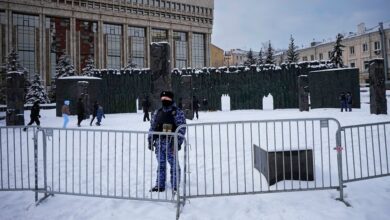Biggest international stories in 2023 on NPR’s website : NPR

Two major conflicts dominated NPR’s international coverage over the past year: Hamas’ attack on Israel and Israel’s fierce response against the Palestinian militant organization; and the war in Ukraine, which is nearing its second anniversary with no clear outcome in sight.
But in addition to those big news events, we had some surprises among the stories from around the world that were viewed most by our readers:
The Israel-Hamas war

A salvo of rockets is fired by Palestinian militants from Gaza toward Israel on Oct. 10. Hamas’ unprecedented attack on Israel started Oct. 7. A senior Hamas official told NPR that its planning was kept a close secret.
Mahmud Hams/AFP via Getty Images
hide caption
toggle caption
Mahmud Hams/AFP via Getty Images

A salvo of rockets is fired by Palestinian militants from Gaza toward Israel on Oct. 10. Hamas’ unprecedented attack on Israel started Oct. 7. A senior Hamas official told NPR that its planning was kept a close secret.
Mahmud Hams/AFP via Getty Images
On Oct. 7, Hamas militants surged over the Gaza border into Israel attacking a music concert, military bases and people in their homes. Israel says some 2,000 militants killed around 1,200 men, women and children — taking about 240 hostage.
Israel responded within hours with airstrikes on the Gaza Strip, vowing to destroy Hamas and rescue hostages. Israeli Prime Minister Benjamin Netanyahu vowed, “Every Hamas member is a dead man,” after forming an emergency government and wartime cabinet. For weeks, Israel’s military pounded Gaza with artillery and airstrikes. Then it launched a ground offensive, sending troops into Gaza to divide it between north and south. The United Nations says 40,000 homes have been destroyed along with bakeries, schools and hospitals, and Gaza health officials say Israeli attacks have killed at least 15,000 people and wounded 40,000 others.
The two sides agreed to a temporary cease-fire and an exchange of hostages held by Hamas for Palestinians held in Israeli prisons in late November, but after three extensions of the original four-day agreement, talks fell apart last week and Israel resumed its attacks in Gaza.
In addition to our coverage of developments in Israel and Gaza, the West Bank and southern Lebanon, where Israel has battled Hezbollah militants, we provided some context around those events.
A slow slog in Ukraine with no end in sight
Russia’s invasion of Ukraine ground on through the year with neither side able to break through and the approaching winter slowing combat operations on both sides.
The year started with Russian President Vladimir Putin proclaiming a cease-fire that wasn’t — and Ukraine never agreeing to one in the first place, although both sides accused the other of violating it.
In March, the International Criminal Court issued an arrest warrant for Putin for alleged war crimes involving accusations that Russia has forcibly taken Ukrainian children.
War fatigue is starting to set in among some of its neighbors, while in a divided Washington, D.C., some — particularly Republicans — are turning against President Biden’s commitment to continue to provide arms and ammunition to Ukraine.
Erdogan faces backlash over “amnesty” in Turkey quake aftermath

Turkey’s President Recep Tayyip Erdogan visited the city center two days after the destructive Feb. 6 earthquake in Kahramanmaras, southern Turkey.
Turkish Presidency via AP
hide caption
toggle caption
Turkish Presidency via AP

Turkey’s President Recep Tayyip Erdogan visited the city center two days after the destructive Feb. 6 earthquake in Kahramanmaras, southern Turkey.
Turkish Presidency via AP
As Turkey struggled in the aftermath of a 7.8-magnitude earthquake in February that killed 35,000 people there and in neighboring Syria, Turkish President Recep Tayyip Erdogan said no government could have been ready for a disaster of such magnitude.
But then videos emerged showing Erdogan bragging about the “zoning amnesty” he granted to builders that allowed them to ignore the safety codes that had been put on the books specifically to make apartment blocks, houses and office buildings more resistant to earthquakes.
Critics say contractors were allowed to skip crucial safety regulations, increasing their profits but putting residents at risk. Engineers and architects say the lack of safety features designed to absorb the shock of earthquakes likely contributed to the death toll.
The revelations fueled public outrage over slow efforts to help residents in the aftermath, which left many injured and without a home, food or heating in the middle of winter.
Kidnapped in Haiti
Alix Dorsainvil, originally from New Hampshire, was working as a community health nurse for a Christian organization in Haiti when she and her daughter were taken in July from El Roi Haiti’s campus in a gang-controlled area near Port-au-Prince.
They were released 13 days later. Who kidnapped them and why remains unclear.
El Roi Haiti said Dorsainvil fell in love with Haiti’s people on a visit there after the devastating 2010 earthquake hit the Caribbean nation. She’s also married to the group’s founder and director, Sandro Dorsainvil, who grew up in Port-au-Prince, Haiti’s capital.
In her first appearance after her release, Dorsainvil told her captors, “I want you guys to know that everything I said during my time in captivity was sincere,” she said in Haitian Creole in a video on El Roi Haiti’s site. “I love you in Christ, and one day I hope to hug you in heaven.”
New discoveries in the cradle of civilization

Zerzevan Castle, the site of a Roman Empire military garrison, is providing what UNESCO calls “important information about the Roman soldiers, civilians’ daily lives and the battles.”
Alice Martins for NPR
hide caption
toggle caption
Alice Martins for NPR

Zerzevan Castle, the site of a Roman Empire military garrison, is providing what UNESCO calls “important information about the Roman soldiers, civilians’ daily lives and the battles.”
Alice Martins for NPR
Archaeologists told us that recent finds in southeastern Turkey promise to change our understanding of Mesopotamia’s history.
Zerzevan Castle, the site of a Roman Empire military garrison, has changed our understanding of pre-Roman activity in the area. UNESCO says it provides “important information about the Roman soldiers, civilians’ daily lives and the battles.”
The Mithras religion — also known as the “Mithras cult” — is believed to have originated in ancient Persia, and the Mithras Temple, discovered six years ago, is possibly the best-preserved such temple in the world, UNESCO says.
There’s still much to be uncovered at the site: There are huge, multistory structures that archaeologists have identified with ground-penetrating radar scans. They are revealing layer upon layer of artifacts, some dating back well into pre-Roman history.
Snakes on a plane, the sequel
Rudolf Erasmus was piloting a private flight from South Africa’s Western Cape to the northeastern town of Nelspruit in April when he felt a cold sensation under his shirt near what he called his “love handles.” When he looked down for the source, he was surprised to see a Cape cobra, whose bite can kill someone in as little as an hour, under his seat.
Concerned about what the snake might do and the safety of his passengers, Erasmus turned the plane around and made an emergency landing in Welkom, the nearest airport.
Erasmus said he had seen the cult 2006 film Snakes on a Plane, and the expletive-laden tirade Samuel L. Jackson’s FBI agent unleashes when he discovers the plane he’s on is full of venomous snakes played out in his head.
“That’s how I felt at some point,” he said, laughing.
South African civil aviation commissioner Poppy Khoza praised Erasmus as “a hero” and said he “saved all lives on board.” The cobra escaped.
Building a castle the old-fashioned way
In October we told the story of a group of heritage trade craftspeople and history buffs that are building a castle in the Burgundy region of France using tools and construction methods from the 13th century.

Matisse Lacroix, 20, a blacksmith at Guédelon Castle, works a large bellows to make the fire hot enough to melt iron and make it malleable.
Cristina Baussan for NPR
hide caption
toggle caption
Cristina Baussan for NPR

Matisse Lacroix, 20, a blacksmith at Guédelon Castle, works a large bellows to make the fire hot enough to melt iron and make it malleable.
Cristina Baussan for NPR
The idea to build Guédelon was born in 1995 among three friends, residents of the area who are also history buffs and nature lovers. One of the three owned a nearby 17th century château and was involved in work to restore different castles in the area. They laid the first stones in 1997, and the builders say it could take 10, 15, even 20 more years to build.
One reason its construction is taking so long is that workers, dressed in medieval clothing and some mandated modern safety equipment, stop their work to explain what they’re doing to visitors as well as train young craftsmen in heritage skills.
The project was initially financed by donations and some European Union funding. It’s now financed through more than 300,000 paying visitors a year, which generate more than $5 million a year that largely covers pay for 100 staff members.
An “unsubstantiated stunt”
Mexico’s Congress took time away from pressing matters of state in September to hear testimony on extraterrestrials. Then came the big reveal.


As self-described ufologist Jaime Maussan spoke, two men uncovered caskets revealing two bodies, which Maussan said under oath were nonhuman.
The corpses looked like stereotypical depictions of aliens — big head, little body, three fingers. Maussan said they were found in Peru in 2017 and are estimated to be 1,000 years old.
Maussan and others have previously presented similar claims about alleged alien remains in the past. Scientists have dismissed them as either ancient Peruvian mummies or manipulated mummies.
The hearing also included remarks by Ryan Graves, one of three U.S. veterans who testified in front of a U.S. congressional subcommittee investigating the existence of UFOs the same month, who later distanced himself from the hearing.
In a post on X, formerly Twitter, he wrote: “Unfortunately, yesterday’s demonstration was a huge step backwards for this issue … I am deeply disappointed by this unsubstantiated stunt.”











